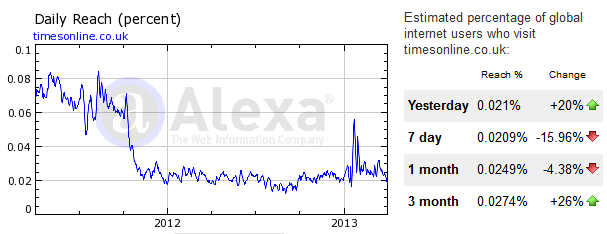During the EU referendum campaign, there were some concerns that a vote to leave the EU would see the reintroduction of mobile roaming charges for UK customers who were travelling in Europe. Since 2007, EU regulations had been reducing the cost of roaming, and all roaming charges were abolished in June 2017 – but many operators had removed their charges before that point in anticipation. The worry was that, without the EU regulations compelling operators to continue with no charges, prices would rise again. Such a concern was, as ever, dismissed.
Continue reading “Why mobile roaming charges are back”The effect of inflation on loyalty schemes
Earlier today, Sainsbury’s supermarkets sent out an email informing people that they were reducing the rate at which they would earn reward points on the Nectar scheme – halving the amount, in fact, from 2 points per pound to one per pound. They were also removing the bonus points available for reusing carrier bags. Continue reading “The effect of inflation on loyalty schemes”
Is a book worth £500?
When looking to buy a copy of Newton’s Telecom Dictionary I noticed that as well as the standard page on Amazon, there was another page
on which the price was set rather higher, along with a more convoluted title. The first time I saw this second page there were in fact three booksellers, all with very high prices:
[table th=”0″]
Sam Books, £432.98
Greenpastures UK, £598.97
UK BOOKDEPOT, £599.00
[/table]
Why would these sellers set such a high price for a book that is readily available? Are they hoping that someone may not be able to find the cheaper version, and mistakenly pay £600? Continue reading “Is a book worth £500?”
Is it good business sense to reduce your customer base?
The following graph would appear to be bad news. This shows the reach of timesonline.co.uk – that is, the proportion of daily Internet users who visit the site. For the first half of 2011, around 0.07% of Internet users visited the site each day; while that seems small, it’s a small proportion of a very large number. Then, in late 2011, the number of users dropped significantly, and (other than a brief temporary increase in early 2013) the site now has a userbase around a quarter of its old level. Continue reading “Is it good business sense to reduce your customer base?”
Racing to the bottom
How much was the last app you bought on your smartphone? It’s very likely that the answer to that question is less than a pound, no matter how complex or detailed that app was. When Apple launched the App Store in 2008, the average price of apps was significantly higher, with games such as Super Monkey Ball selling for £5.99 and Crash Bandicoot Nitro Kart at $12.99. Over time, the huge competition has led to games dropping prices to 69p, or even free, with new revenue streams being established through advertising or additional purchases. Along with this fall in pricing, many firms have found that it’s not profitable to spend time developing complex games and applications, leading to a proliferation of match-three and simple physics puzzlers. Continue reading “Racing to the bottom”
Distinguishing demand effects and supply effects
Greg Mankiw has today highlighted how Bryan Caplan discusses fundamental inconsistencies in arguments over the minimum wage.
In some of his research, joint with Alan Krueger, Card finds that increases in the minimum wage have negligible effects on employment. In other research, on the Mariel boatlift, Card finds that increases in the supply of unskilled workers have negligible effects on wages and employment of existing workers.
Caplan notes that these results are hard to reconcile: The former suggests that labor demand is highly inelastic, whereas the latter suggests it is highly elastic. Continue reading “Distinguishing demand effects and supply effects”
Sheltering under an umbrella
Prior to yesterday’s announcement of the iPad Mini, there was a great deal of speculation as to its form, its capabilities, its existence and its price. Commentators saw the rumoured tablet to be a direct competitor to the Kindle Fire and the Nexus 7, indicating that they believed Apple was concerned about losing market share in that market. The price was rumoured to be around the same level as those competitors, so that the differences which would make people want to buy an iPad over an Android tablet would be the quality of the hardware and the app marketplace. Continue reading “Sheltering under an umbrella”
Over the tipping point
The BBC reports today that Louise Mensch, an MP in the UK, has launched a “rival to Twitter”. Mensch herself argues that it is not a rival, but instead seeks to be somewhere where discussion is kept in a broad topic, unlike the free-for-all that Twitter represents. Continue reading “Over the tipping point”
Is free too cheap?
At the beginning of February, Google lost a court case in France where a competitor – Bottin Cartographies – has accused them of anti-competitive pricing. The story has been reported by Forbes and CNET with some confusion over what exactly has been discussed.
The basis of the case appears to be that Bottin Cartographies has alleged that Google is giving away its maps service for free, which is a move designed to ensure that nobody else can compete and are driven out of the market. Once Google has no competition, it will be able to raise its price and abuse its market power. Continue reading “Is free too cheap?”
Prices of electronic books
A quick browse of Amazon shows that many books available through the Kindle are priced around the same level as the physical product. The cost of provision of these electronic books is much lower, however: printing costs, distribution costs, and even the margins to retails are either non-existent or significantly reduced. Why, then, is there this equivalence in pricing? Continue reading “Prices of electronic books”
